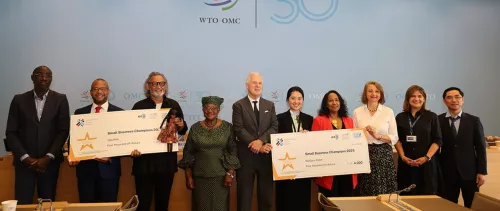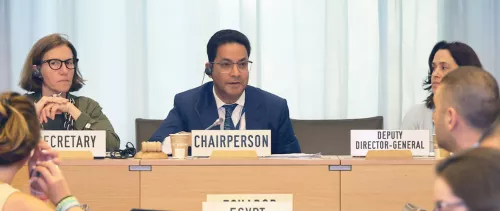
This newsletter provides brief updates related to the Joint Statement Initiatives (JSIs) on investment facilitation, electronic commerce, and micro, small, and medium-sized enterprises (MSMEs).
Investment Facilitation
Since the publication of our last newsletter, WTO Members participating in the Structured Discussions held two negotiating meetings and two intersessional meetings. In that context, they have continued work on new proposals as well as on the “Easter Text” (circulated by the coordinator of the structured discussions in mid-April), which is becoming the main basis for negotiations.
According to a summary record of the negotiating session held on June 15-16 (INF/IFD/R/24), participants received an update from the facilitators of the Small/Discussion Groups on “Scope” and on “'Facilitation of the Entry and Temporary Stay of Business Persons for Investment Purposes” (Movement of Business Persons – MBP). Participants discussed revised versions of Section II (“Transparency of investment measures”) as well as of Provision 30 on “Responsible Business Conduct”. Participants also considered text prepared by the coordinator on a possible Most-Favoured Nation (MFN) Treatment provision and continued discussions on a revised version of a proposed provision on 'Transfers and Payments” submitted by one delegation. On June 15, participants held a dedicated session on implementation, technical assistance, and capacity building.
When they met on July 12 and 13, according to the annotated agenda by the coordinator (INF/IFD/W/35), Members received reports from the facilitators of the Small/Discussion Groups on “Scope” and on MBP. Among other topics, they also discussed draft provisions of the “Easter Text”. These include the “Preamble” and provision 1 on “Objectives”; text under title 31 “Measures against corruption”; provisions 35 on “Dispute Settlement” and provision 36 on “Final Provisions”. Participants also conducted a “stocktaking exercise” aimed at assessing the state of play in the negotiations and planning their activities for the second half of the year up to the WTO’s 12th Ministerial Conference (MC12).
Towards the end of July, the coordinator issued a revised version of the “Easter Text” (INF/IFD/RD/74/Rev.1). This document contains updates to Sections II (“Transparency of investment measures”); III (“Streamlining and speeding up administrative procedures”); IV (“Focal points, domestic regulatory coherence and cross-border cooperation”); and, VI (“Sustainable investment”). It also includes some new definitions in Section I “Scope and general principles”.
At the beginning of August, the coordinator circulated revised text for the preamble, as well as for Articles 1 on Scope, 24 on Cross-Border Cooperation, and 35 on Dispute Settlement.
According to the timetable adopted by participants (INF/IFD/W/29/Rev.2), the next negotiating meetings will be held on September 7-8, October 4-5, November 2-3, and November 24. Intersessional meetings, if needed, will be held on September 23, October 20-21, and November 16-17.
Electronic Commerce
The negotiations under the e-commerce JSI involved two plenary meetings on June 21 and July 22.
During the plenary meeting held on June 21, participating Members initiated discussions over the options for the integration of the outcome of the e-commerce JSI into the WTO legal framework. Ambassador Yamazaki (Japan), co-convenor of the initiative, characterized the discussions on data flows, data localization, and the “legal architecture” as "challenging" and emphasised the need “for participants to give due consideration on how to move forward". Ambassador George Mina (Australia), co-convenor, also pointed to a number of "key issues" where intensified negotiations and discussions are still needed to narrow down differences and deliver progress; these include data flows, localization, source code, and customs duties on electronic transmissions.
At the plenary meeting held on July 22, facilitators of small group discussions provided updates on their groups' progress. The co-convenors—Australia, Japan, and Singapore—noted the progress made by participating Members, with “cleaned” articles on spam, electronic signatures and authentication, and e-contracts. Open government data and online consumer protection are “virtually cleaned” with one outstanding issue remaining in both texts, as per their respective small-group leaders' updates. Concerning other topics, the deliberations of the small group on open internet access are still ongoing and the recently established small group on electronic transactions frameworks had "useful" early discussions, as reported by the UK, and will intensify their work. On the same occasion, participants also initiated discussions on cybersecurity and on electronic availability of trade-related information; discussions on cybersecurity are expected to intensify in the second half of the year.
In other related developments, proposals were submitted by the following members: i) Nigeria on Flow of Information (INF/ECOM/65); ii) Cote d'Ivoire on options for capacity building and technical assistance (INF/ECOM/66), and iii) Brazil and the Republic of Korea on access to online platforms/competition (INF/ECOM/67).
As in previous occasions, participating members held information sessions with thematic experts. In this context, members received presentations on issues related to services market access from the OECD, the Information Technology Industry Council, and the National Foreign Trade Council.
Micro, Small, and Medium-Sized Enterprises
The MSME Informal Working Group (IWG) held two meetings on June 24 and on July 26, respectively. Participating members discussed a draft Ministerial Declaration for MC12, reviewed the implementation of the package of six recommendations and declarations adopted in December 2020, and continued discussions on specific substantive issues based on presentations by the Director General of the World Intellectual Property Organisation (WIPO) as well as on submissions by IWG Members.
Ministerial Declaration on MC12: Members of the IWG moved closer to a final text (INF/MSME/W/33/Rev.2), with only a few remaining brackets around issues still under consideration. At the meeting held on 26 July, the Coordinator of the Group, Ambassador José Luis Cancela (Uruguay), urged members to intensify their consultations and announced he will discuss with all concerned members with the aim to finalize the text for adoption by the IWG at its next meeting on September 24, 2021.
Review of the implementation of the December 2020 Package: The Group reviewed the implementation of the package, which contains a set of voluntary and non-binding recommendations and declarations on various areas. The IWG discussed ways to track actions taken to support their implementation. In connection to that, Uruguay and Brazil provided updates on their preparations for setting up automatic transmission of tariff and trade data to the WTO Integrated Database (IDB). In turn, Côte d'Ivoire indicated that it would submit its proposed roadmap regarding the recommendation on access to trade finance at the September meeting,
Other topics: Members heard presentations on intellectual property rights and innovation in relation to MSMEs by WIPO’s Director General Daren Tang and by the WTO Secretariat. DG Tang introduced the organization's work to develop intellectual property tools (such as the IP Diagnostic Tool) to support MSMEs' growth and innovation. The WTO Secretariat informed the Group on how the issue of MSMEs and innovation has been raised in the TRIPs Council since 2014. This includes discussions of national strategies to help MSMEs deal with the complexity of IP systems; technical assistance; and the linkages with e-commerce. Ecuador shared its experience in supporting MSMEs' innovation in rural areas, in particular in the flower and agribusiness sectors.
Other initiatives: The “Digital Champions for Small Business” initiative (aimed at helping small businesses go digital and increase their participation in international trade) was launched on June 25. Proposals on how to help MSMEs address the difficulties they face with digital trade are to be submitted before September 15. The winning proposals will be announced at MC12.
The original newsletter can be accessed here.


